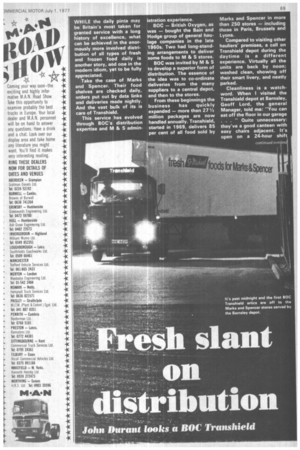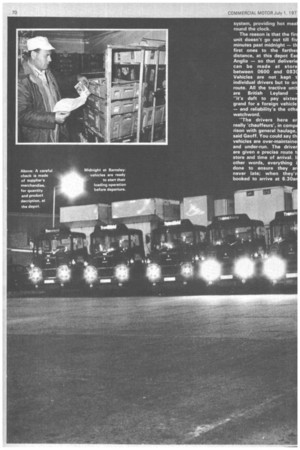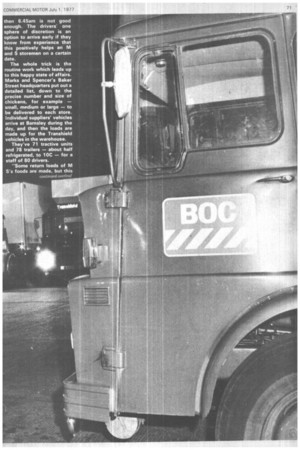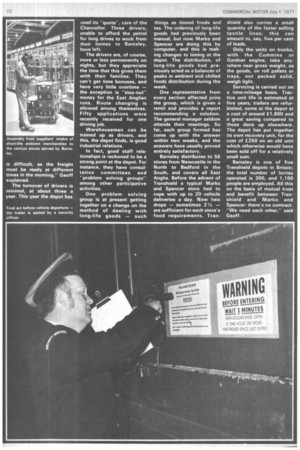WHILE the daily pinta may be Britain's most taken for
Page 71

Page 72

Page 73

Page 74

If you've noticed an error in this article please click here to report it so we can fix it.
granted service with a long history of excellence, what can be achieved in the enormously more involved distribution of all types of fresh and frozen food daily is another story, and one in the modern idiom, yet to be fully appreciated.
Take the case of Marks and Spencer. Their food shelves are checked daily, orders put out by data links and deliveries made nightly. And the vast bulk of its is care of Transhield.
This service has evolved through BOC's distribution expertise and M & S admin
istration experience.
BOC — British Oxygen, as was — bought the Bain and Hodge group of general haulage companies in the late 1960s. Two had long-standing arrangements to deliver some foods to M & S stores.
BOC was invited by M & S to develop a superior form of distribution_ The essence of the idea was to co-ordinate deliveries from the many suppliers to a central depot, and then to the stores.
From these beginnings the business has quickly expanded — more than 27 V2 million packages are now handled annually. Transhield, started in 1969, delivers 85 per cent of all food sold by Marks and Spencer in more than 250 stores — including those in Paris, Brussels and Lyons.
Compared to visiting other hauliers' premises, a call on Transhield depot during the daytime is a different experience. Virtually all the units are back by noon; washed clean, showing off their smart livery, and neatly parked.
Cleanliness is a watchword. When I visited the Transhield depot at Barnsley, Geoff Lord, the general Manager, told me: "You can eat off the floor in our garage . . . " Quite unnecessary: they've a good canteen with easy chairs adjacent. It's open on a 24-hour shift system, providing hot mea round the clock.
The reason is that the fir unit doesn't go out till fi minutes past midnight th first ones to the farthe distance, at this depot Ea Anglia — so that deliveri can be made at store between 0600 and 083 Vehicles are not kept t individual drivers but to on route. All the tractive uni are British Leyland "it's daft to pay sixtee grand for a foreign vehicle — and reliability's the oth watchword.
'The drivers here ar really 'chauffeurs', in comp rison with general haulage, said Geoff. You could say th vehicles are over-maintaine and under-run. The driver are given a precise route t store and time of arrival. I other words, everything i done to ensure they ar never late; when they'r booked to arrive at 6.30a then 6.45am is not good enough. The drivers one sphere of discretion is an option to arrive early if they know from experience that this positively helps an M and S storemen on a certain date.
The whole trick is the routine work which leads up to this happy state of affairs. Marks and Spencer's Baker Street headquarters put out a detailed list, down to the precise number and size of chickens, for example — small, medium or large — to be delivered to each store. Individual suppliers' vehicles arrive at Barnsley during the day, and then the loads are made up for the Transhield vehicles in the warehouse.
They've 71 tractive units and 78 trailers — about half refrigerated, to 10C — for a staff of 80 drivers.
"Some return loads of M S's foods are made, but this continaed overleaf
is difficult, as the freight must be ready at different times in the morning," Geoff explained.
The turnover of drivers is minimal, at about three a year. This year the depot has used its "quota", care of the Chancellor. Three drivers, unable to afford the petrol foir long drives to work from their homes to Barnsley, have left.
The drivers are, of course, more or less permanently on nights, but they appreciate the time that this gives them with their families. They can't get time bonuses, and have very little overtime — the exception is "stay-out" money for the East Anglian runs. Route changing is allowed among themselves. Fifty applications were recently received for one driving job.
Warehousemen can be trained up as drivers, and this, the depot finds, is good industrial relations.
In fact, good staff relationships is reckoned to be a strong point at the depot. For instance, they have consultative committees and "problem solving groups" among other participative activities.
One problem solving group is at present getting together on a change on the method of dealing with long-life goods — such things as tinned foods and tea. The ordering of long-life goods had previously been manual, but now Marks and Spencer are doing this by computer, and this is making changes to timing at the depot. The distribution, of long-life goods had previously acted as a balancer of peaks in ambient arid chilled foods distribution during the week.
One representative from every section affected joins the group, which is given a remit and provides a report recommending a solution. The general manager seldom attends their meetings. So far, each group formed has come up with the answer within two weeks, and the answers have usually proved entirely satisfactory.
Barnsley distributes to 56 stores from Newcastle in the North to Bedford in the South, and covers all East Anglia. Before the advent of Transhield a typical Marks and Spencer store had to cope with up to 20 vehicle deliveries a day. Now two drops — sometimes 21/2 — are sufficient for each store's food requirements. Tran
shield also carries a small quantity of the faster selling textile lines; this can amount to, say, five per cent of loads.
Only the units on trunks, with the Cummins or Gardner engine, take anywhere near gross weight, as the goods, on roll pallets or trays, not packed solid, weigh light.
Servicing is carried out on a time-mileage basis. Tractive unit life is estimated at five years; trailers are refurbished, some at the depot at a cost of around £1,800 and a great saving compared to those done up elsewhere. The depot has put together its own recovery unit, for the cost of £250 on an old unit which otherwise would have been sold off for a relatively small sum.
Barnsley is one of five Transhield depots in Britain; the total number of lorries operated is 300, and 1,100 people are employed. All this on the basis of mutual trust and benefit between Transhield and Marks and Spencer: there's no contract. "We need each other," said Geoff.








































































































































